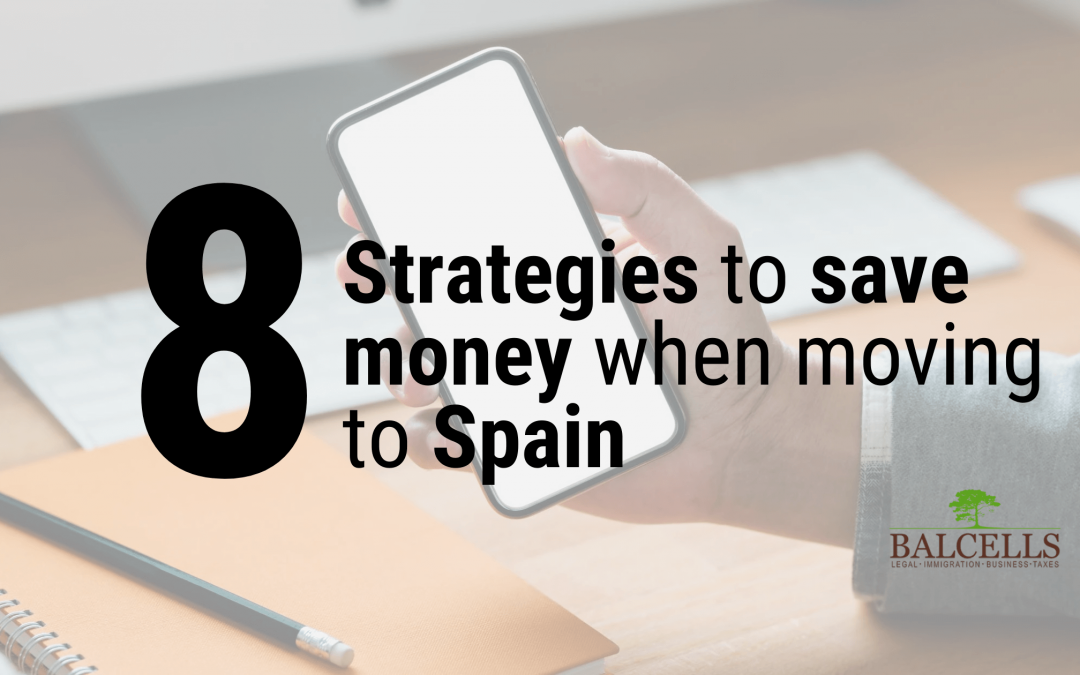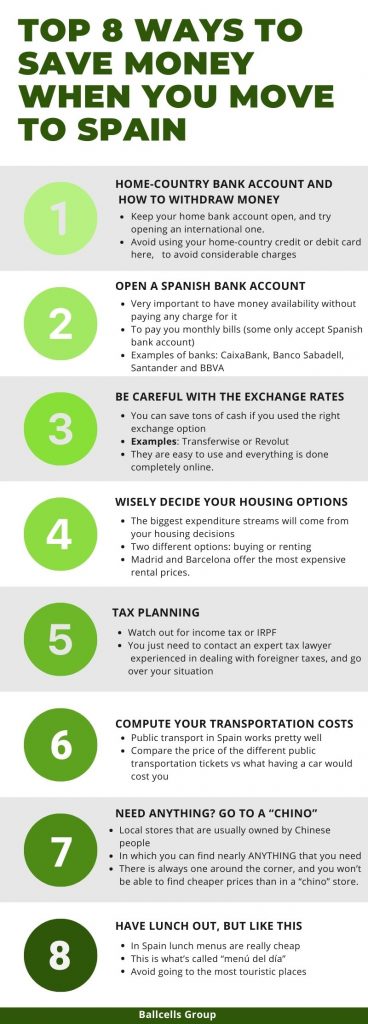Planning to move to Spain? Then there are a couple of things you should really bear in mind if you want to avoid spending extra. A different country with different rules, so learning all the useful tips and strategies that have helped thousands of expats worldwide is 100% essential. And that is what you are going to do now. In this article you will learn the top 8 ways to save money while moving to Spain.
So let’s get started!
Home-country bank account and how to withdraw money
Let’s being with one of the issues that will surely most affect you as a foreigner in the Spanish territory: banking.
The first question we must answer is: should you close your existing bank account in your country of origin?
The answer is definitely no. Keep the bank account you already possess open. Why? First of all, because you never know when you are going back. Perhaps you will return several times throughout the year to visit family and friends, and being able to use your local account freely will be completely beneficial.
On the other hand, and especially if you are from the UK, living in Spain for a while means that you may find it difficult to re-open an account if you decide to move back again.
Our advice? Keep your original bank account open, and try opening an international one. You will need to withdraw money periodically while in Spain, so you can’t be charged every time you do that. It’s simply too expensive.
Hence, it’s ideal to combine your international account with a service like N-26, a free-fee credit card that will allow you to withdraw euros from any ATM (totally free of charge).
Needless to say, avoid using your home-country credit or debit card here. You will be imposed important charges too, and when those come repeatedly in time, the total fee can be huge.
Open a Spanish bank account
But, what would be even better?
As we saw in our how to move to Spain post. The process of opening a bank account may be a bit tedious and long (in some cases), but it is definitely the best alternative if you are planning to live in Spain longer than what a holiday trip lasts.
Why?
First of all, due to money availability. You will be able to withdrawn money in any of your Spanish bank ATMs (they are everywhere), and without paying any charge for that.
But, secondly, if you settle in the country, there are some charges you will have to pay on a monthly basis.
Think about water, gas, electricity, or your phone line.
And many times those companies won’t accept you unless you have a Spanish bank account.
So in case this has already convinced you, here you can find a complete guide detailing the process to open a bank account as a foreigner. It will definitely clear all your doubts and outline an easy-to-follow path.
But, for now, bear in mind that the process changes whether you are a resident or not (non-residents must open a non-resident bank account, which requires a “certificado de no residente” from the Police Office).
All the different alternatives are good options, and it will be a matter of careful analysis. But the main banks are:
Be careful with the exchange rates
Exchange rates are one of those things that seem to be a really small issue, but that turn out to generate a huge impact on your finances.
Because yes, you could save tons of cash if you used the right exchange option. And taking into account that you will exchange no matter what, choosing wisely the go-to method is kind of a must.
Our advice is to use one of the trendy apps or services like Transferwise or Revolut.
Their main advantage is that they are easy to use and everything is done completely online.
You will be saving money every time you do an exchange due to their really low fees. And Revolut will even give you a credit card!
Wisely decide your housing options
There is no denying the fact that one of the biggest expenditure streams will come from your housing decisions.
And, in that sense, you have two different options: buying or renting.
Let’s see which are the important considerations if you wish to save money in both cases.
First of all, if you are going to rent a flat, start by doing some research first. You may be tempted to think that rental prices in Spain are really cheap, especially if you compare with your country of origin, but within the country itself there are huge differences.
Madrid and Barcelona offer the most expensive rental prices. But if you have already decided you would like to settle in any of them, it’s still feasible. The only thing you’ll need to do is to be patient, take your time until the right option appears, and check out the different neighborhoods inside the city. You will find really decent options!
On the other hand, if you are planning to buy, the situation is somewhat different. Prices in the big capitals are much higher in price, so perhaps the best option would be to 1. look for the surroundings of the main cities, or 2. focus on the not so common regions.
Valencia, very similar to Barcelona in terms of vibe and climate; or the South of Spain (Andalucia) can be ideal options for expats who wish to save some money when purchasing a property.
Finally, you should also bear in mind the real costs of buying a house. Sometimes we tend to just consider the price itself, but there’s much more. There are several taxes and costs that you need to add up, and that makes the price vary significantly (up to 15% extra).
Here you can find a list of all those extra taxes and costs.
Tax planning
What is tax-efficient in your home country may not be so in Spain. Taxes, especially those for expats, work completely differently in the Spanish territory.
And you should be aware of those differences so you can plan accordingly.
Among others, the first thing you should watch out is income tax or IRPF. If you receive incomes from abroad, you can avoid paying income tax twice by appealing to the existing double treatment conventions between Spain and your country.
Also, if you came to the country to work, you can apply for the Beckham law and enjoy really important tax deductions.
But that is not all. You should also be aware of the proper investment structure if you hold several assets; and when it comes to your company structure things may also need careful thought.
The bottom line is this: taxes are a huge expense anywhere. And as the rules in Spain are different, if you want to avoid wasting money here you should really give it a thorough look.
Because yes, you could save tons of euros by doing things right.
You just need to contact an expert tax lawyer experienced in dealing with foreigner taxes, and go over your situation with him or her to find out the best options according to your needs.
Our accountancy team at Balcells group can help you exactly with that. You just need to send us an email detailing your situation and we will help you out:
Compute your transportation costs
Public transport in Spain works pretty well. Especially if we are talking about Madrid or Barcelona, you would really want to avoid taking your car: too many traffic jams and too much stress on the road.
The metro simply takes you everywhere and it does so fast. And when the metro is not a good fit, the bus will do the work.
Nevertheless, depending on where you live (perhaps you are settled in the surroundings of a bit city where the metro has no stop) and your daily commute route, you may find it better to go by car or motorcycle.
So you need to plan that in advance too if you are to save some money.
You’ll need to compare the price of the different public transportation tickets (there are important discounts when you buy a monthly ticket vs just a single trip) vs what having a car would cost you (fuel + your parking space).
Just so you can have a broad idea, here are the fares and ticket prices in the big cities:
Need anything? Go to a “Chino”
If you are from the UK or have visited the country a couple of times you must be really familiar with stores like Poundland or Poundworld.
You can buy a wide array of things at a really cheap price.
Well, in Spain the equivalent to that is called “chino”. We are talking about local stores that are usually owned by Chinese people (hence the name), in which you can find nearly ANYTHING that you need.
You need scissors? You go there. You need a box? You go there. Your phone charger has broken and you need a new one? You also go there.
There is always one around the corner, and you won’t be able to find cheaper prices than in a “chino” store.
Have lunch out, but like this
You can still have lunch at a restaurant, not take your own food, and still be able to save money.
How is that possible?
Because in Spain lunch menus are really cheap. You can have a delicious and complete menu (including starter, main dish, drink, bread, and coffee) for just 10€ (even though you can find cheaper ones).
This is what’s called “menú del día”, and they are always completely delicious and nutritious. That is the power of the Mediterranean diet!
The only thing you need to do is to avoid going to the most touristic places and find a local restaurant.
You will eat better than at home and without paying a big amount of money!
This has been our top 8 recommendations to save money when moving to Spain as a foreigner. Apply each of them and your finances will thank you! Do you have any other recommendations? Do not hesitate to leave a comment down below sharing your experience 🙂
And as always, if you need legal advice, our lawyers are at your disposal!
Book a consultation with one of our lawyers and solve all your doubts:

At Balcells Group we have been foreigners effortlessly moving to Spain for over 11 years. We help expats from all around the world with their immigration, business, tax and legal needs; ensuring a legally safe and enjoyable transition to the Spanish territory. Our multilingual team understands the importance of adapting to the cultural and legal specificities of our international clients. We offer a comprehensive service that combines the expertise of several generations of lawyers with the innovation needed to address today’s legal challenges, always striving to simplify processes and ensure reliable, effective results.




